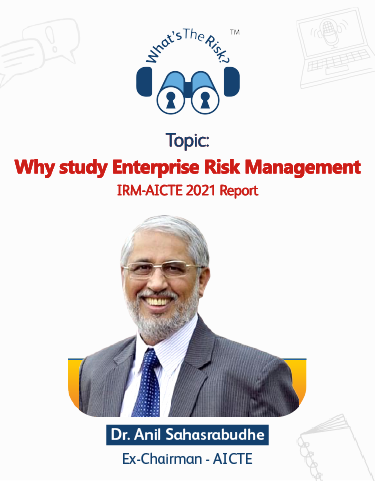The corporate world is aware of the risks and challenges it faces and has risk management systems in place to mitigate them. But most academic institutes are not even aware of the terminology, although there are few courses on the subject in management schools. Institutions do perform SWOT analysis while formulating their vision, mission and objective setting – but little beyond. That’s why AICTE has taken numerous key initiatives to create awareness about risk management, now so much more important in a pandemic era.
Risk management identifies and establishes probable risk structures in a given organisation. Once these two factors are identified, it’s the responsibility of management to create an enterprise risk road map and mitigate risk in a sustainable way. This map covers all the operational segments susceptible to risk and drives all necessary reforms. It helps drive risk awareness, risk reporting, risk avoidance and risk resolution across the organisation.
AICTE is the lead regulator within the Ministry of Education. It is preparing engineering and technical higher education institutions all over the country to manage the profound impact of COVID-19, making risk management an integral part of the decision-making process. Higher education institutions and organisations will form risk management teams able to classify the volumes of risk involved and assign those risks to the right management teams.
Alongside risk management teams there needs to be a risk management programme that monitors the institution’s aims, objectives, history, property assets, teachers, students and resources. To achieve better results and meet risk management programme timelines, it’s essential to nominate responsible officers who are accountable. These people must plan and implement the risk management programme and prioritise risks as they are identified.
The penultimate part of the above risk management programme is to monitor and review the plan from time-to-time. A consistent focus here is key to ensuring that no emerging risk results in an unprecedented or impossible challenge. The risk management board is also essential to ensuring best practice.
With an increasing regulatory focus on enterprise risk management, there is already rising demand for qualified ERM and risk-intelligent professionals. These people must have the skills to identify and manage not only financial risks but also cybersecurity, reputation, climate change and supply chain uncertainties. Corporate India, academia and government are working towards building resilience and ensuring even better preparedness for high probability and high impact occurrences – so-called ‘grey rhino’ events. We believe our association with the IRM in India – the world leader in ERM examination and research in over 140 countries – will prepare Indian institutions and students with the ERM skills needed to prosper within Industry 4.0.
Download the IRM-AICTE Report on ERM and the Indian Higher Education System
Blog Author: Dr. Anil Sahasrabuddhe, Ex-Chairman, AICTE













